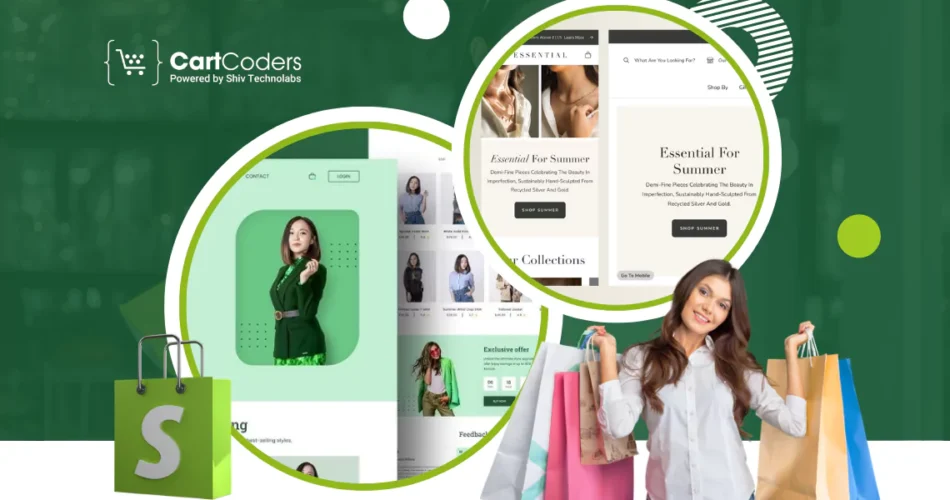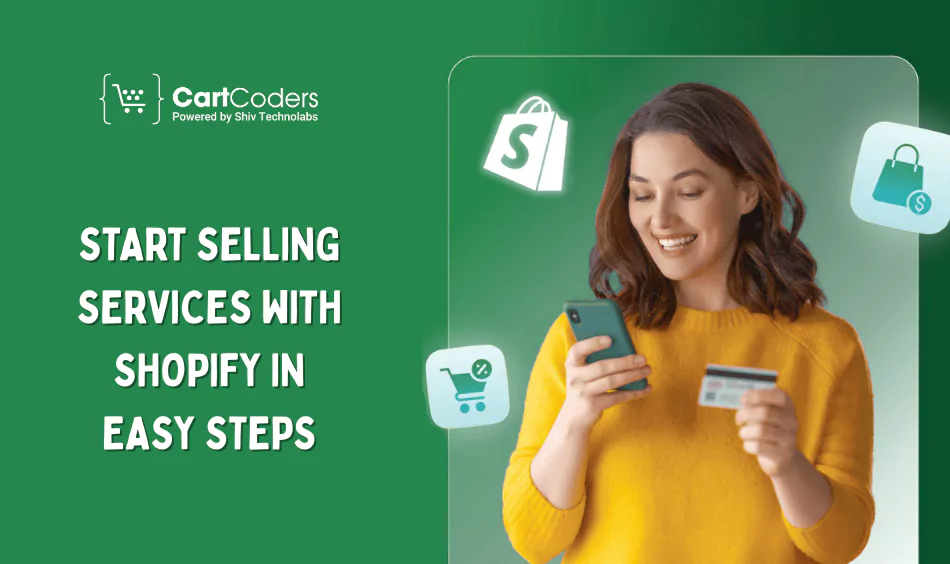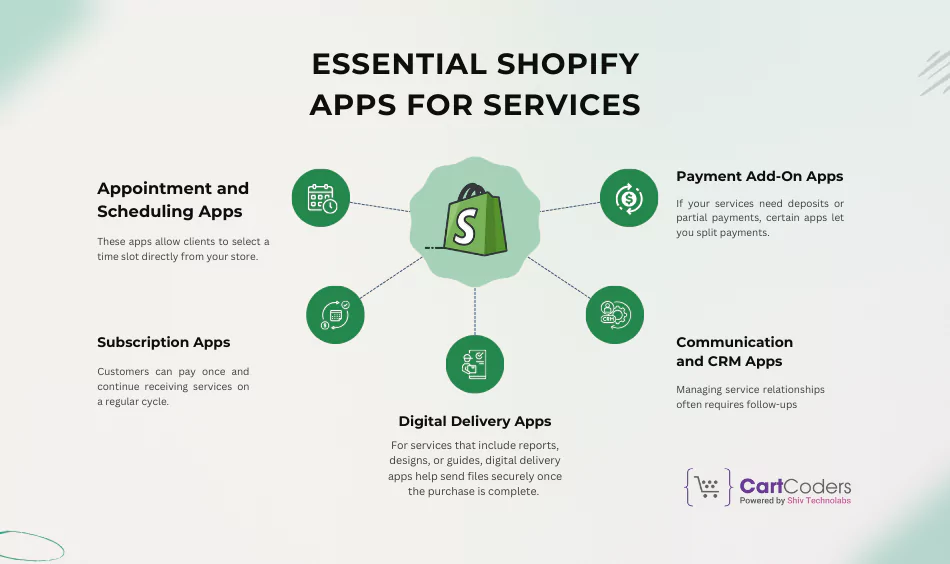Custom Engagement Solutions
Unlock tailored solutions with a free, no-obligation strategy session.
Expert Developers & Engineers on Demand
Scale Your Team with Skilled IT Professionals
Expert Guidance for Digital Transformation

Have you ever thought about how to sell services on Shopify or any other eCommerce platform for that sake but weren’t sure how to start?
Shopify is often linked with physical products, yet it can also power service-based businesses with the same ease.
Whether you’re a coach, designer, consultant, or freelancer, turning your expertise into sellable packages on Shopify is not only possible—it’s practical.
In this step-by-step guide, we’ll cover how to set up your store for services, design listings that attract clients, integrate booking tools, and manage payments.
By the end, you’ll know how to present your skills/services on Shopify in a way that drives both trust and sales.
While Shopify is known for selling products, it’s just as powerful for service-driven businesses. The key lies in packaging your expertise in a way customers can understand and purchase quickly. Here are some categories where Shopify works particularly well:
Doctors, personal trainers, stylists, therapists, and consultants often rely on structured schedules. Shopify makes it easy to turn each slot into a purchasable service. By integrating booking apps, customers can:
Consultations are among the most common services sold online. With Shopify, advisors can offer services such as:
Each consultation can be listed as a product with variants based on session length or type. Payment is collected upfront, so there’s no billing hassle afterward.
Events require professionals such as photographers, decorators, entertainers, and caterers. Shopify allows you to structure these services into packages that highlight what clients will receive. You can include:
By adding testimonials, portfolios, or past event images, you create trust and make bookings easier.
Tutors, instructors, and coaches can sell education-based services through Shopify in two ways: live sessions or digital courses. With the right apps, you can:
Everyday home services—like cleaning, plumbing, electrical repair, and appliance maintenance—can also be sold on Shopify. The booking process is simple:
✨ With these categories, it’s clear that Shopify isn’t just a platform for retail—it can support nearly any service business model when set up the right way.

Selling services on Shopify starts with shaping your store to fit a service-first model. Unlike physical products, services depend on clarity, trust, and smooth booking. Here are the key steps:
Choose a theme that keeps the focus on descriptions, pricing, and calls to action. A clean layout with strong visuals and minimal clutter works best for service offerings.
Your store should answer client questions before they even reach out. At minimum, include:
3. Add Trust Elements
Services are intangible, so proof matters. Display client reviews, case studies, or certificates to build credibility. Even small trust markers make buyers more comfortable booking online.
Since no product is being shipped, adjust checkout to suit services:
Booking and scheduling apps are essential for smooth service delivery. Subscription tools work well if you offer recurring sessions or retainers. Pick apps that match the way you deliver services.
On Shopify, every service is treated like a product. The difference is in how you structure the details. A clear listing helps customers understand exactly what they’re buying.
Since services aren’t physical items, inventory tracking is unnecessary. Disable stock tracking to avoid confusion.
Instead of product photos, add graphics, banners, or videos that explain your service. Visuals help customers understand the value at a glance.
Allow customers to leave instructions during checkout. This could include preferred time slots, project details, or special requirements.

Shopify’s strength lies in its app ecosystem. For service-based stores, the right apps turn a simple product listing into a fully functional booking or subscription system.
These apps allow clients to select a time slot directly from your store. They sync with calendars, send reminders, and reduce missed bookings. Ideal for consultants, trainers, and healthcare providers.
If your services are recurring—like coaching, fitness classes, or monthly support—subscription apps help you set up automated billing. Customers can pay once and continue receiving services on a regular cycle.
For services that include reports, designs, or guides, digital delivery apps help send files securely once the purchase is complete. This creates a smooth experience for clients expecting additional materials.
Managing service relationships often requires follow-ups. CRM tools within Shopify help you track client interactions, automate email reminders, and maintain stronger relationships.
If your services need deposits or partial payments, certain apps let you split payments. This is especially useful for event-related services that require booking in advance.
This part is less about features and more about customer trust. A payment flow designed for services should feel simple and safe:
The entire goal is to keep checkout quick while giving customers confidence that they’re booking a professional service.
Having your services listed is only half the job — the real growth comes from making sure people find you, remember you, and book with you. Instead of a rigid checklist, think of marketing in layers:
Marketing services on Shopify isn’t about one big campaign. It’s about creating small touchpoints that guide people from awareness to booking, then keeping them connected for the long run.
One of the best parts about using Shopify for services is the predictable pricing. You don’t need to build a custom booking system from scratch — instead, you pay for Shopify’s plans and add apps that fit your business model. Costs vary depending on the features you need.
Here’s a breakdown:
| Cost Element | Details | Approx. Price Range |
| Shopify Plan | Core subscription includes hosting, checkout, and admin tools. | $39 – $399 / month |
| Booking / Scheduling Apps | Needed for appointments, classes, or home services. | $10 – $50 / month |
| Subscription Apps | For recurring services like coaching or support retainers. | $20 – $80 / month |
| Digital Delivery Apps | Send files, reports, or learning materials securely. | $10 – $40 / month |
| CRM & Communication | Helps track client data, send follow-ups, and manage relationships. | $15 – $100 / month |
| Payment Processing Fees | Charged per transaction by Shopify Payments or third-party gateways. | ~2.9% + $0.30 per order |
👉 Total estimated cost (first year):
These costs cover your Shopify subscription, apps, design, and essential tools for service delivery. Transaction fees will depend on your sales volume, so larger businesses should factor in an additional margin for that.
Unlike product sellers, you don’t have to worry about inventory, shipping, or warehouse costs — making Shopify a cost-effective option for service providers.
Specializing in locker rentals at events, they’ve turned what is typically an offline service into a smooth, online booking experience—fully handled through Shopify.
Clients can browse available locker sizes, choose rental timeframes, and make payments instantly—no in-person hassle. This showcases Shopify’s adaptability to event-based services.
Novanym offers naming, branding, and domain packages—but operates like an online store. Clear service options are presented much like products: packages you can purchase directly.
It turns a creative agency model into a streamlined e-commerce flow, supported entirely by Shopify.
This company provides styling or mannequin display services (likely to fashion retailers or stylists).
Their listing under “Services” on Shopify’s success stories page proves that specialized B2B styling or display services can be showcased effectively through the platform.
These fitness and wellness brands use Shopify to market classes, sessions, and wellness programs.
Though highlighted via GemPages, their presence shows that live classes, course packages, and wellness offerings work seamlessly within Shopify’s structure.
A hair salon or stylist group using Shopify through GemPages. They’ve crafted booking flows and service lists that appeal to clients seeking personal care, showing how even traditional appointment-based services adapt well to Shopify.
Turning Shopify into a service-selling platform takes more than just adding listings. You need the right setup for bookings, payments, and client management. That’s where CartCoders comes in.
With years of Shopify experience, CartCoders has helped consultants, agencies, and service providers run profitable online businesses. If you’re planning to sell services on Shopify, you can hire a Shopify consultant from our team to guide you from setup to growth.
Selling services on Shopify is no longer a side use case — it’s a proven model adopted by businesses across industries.
From event-based services, to branding agencies, and even wellness brands offering fitness classes, Shopify has shown it can support service-driven businesses just as effectively as product sellers.
The key lies in presenting services with clarity, structuring checkout for bookings instead of shipping, and adding the right apps for scheduling, subscriptions, or client management.
Once set up, Shopify not only simplifies service delivery but also gives you tools to market and grow your business long-term.
Whether you’re a solo consultant or a full-scale agency, contact CartCoders today. Our team can design, customize, and scale your Shopify store to fit your unique business model.
Think of your service as a product. You set it up in Shopify, add a clear description, list what’s included, and set a price.
There’s no stock to manage—so inventory tracking is switched off. If timing matters, connect a scheduling app so customers can book a slot while paying online.
For many, yes. Shopify gives service providers the same advantage product sellers enjoy: a professional storefront, a secure checkout, and tools to manage clients.
Imagine a coach, a designer, or a local repair business—all of them can package their offerings, accept payments, and build client trust without needing a custom system.
They do. Event photographers take bookings, tutors sell class bundles, and consultants charge for sessions—all through Shopify. What’s interesting is that some of these businesses combine products and services.
A trainer, for example, might sell workout plans alongside one-on-one sessions. Shopify handles both models easily.
Almost anything that can be described, priced, and delivered without shipping. Some popular categories include:
– Appointments (like therapy sessions or fitness training)
– Professional consultations
– Classes and courses
– Event support
– Home services
It’s about clarity—if a customer knows exactly what they’re paying for, it works well on Shopify.
This is where apps step in. Instead of emailing back and forth, customers see your available slots right on your site, choose a time, and pay.
The system updates your calendar, sends reminders, and avoids double bookings. It feels effortless both for you and your clients.
Projects delivered in 15+ industries.
95% retention rate, building lasting partnerships.
Serving clients across 25+ countries.
60+ pros | 10+ years of experience.